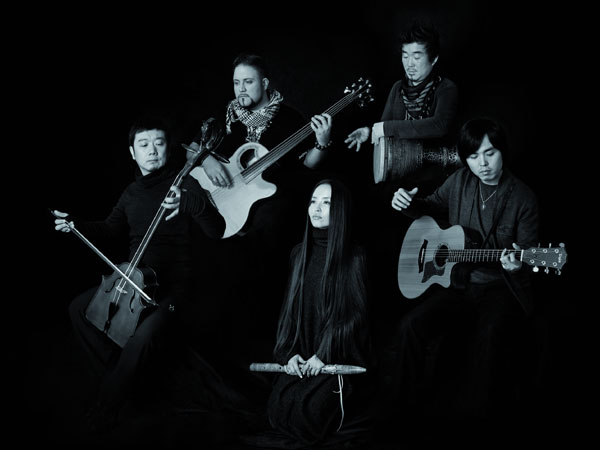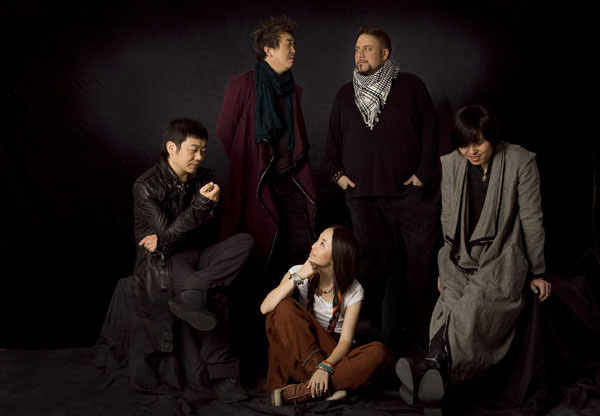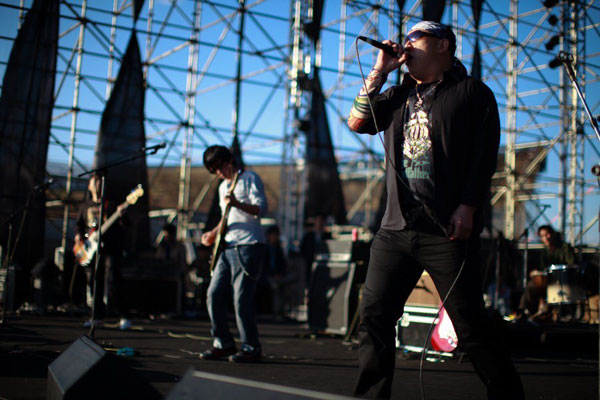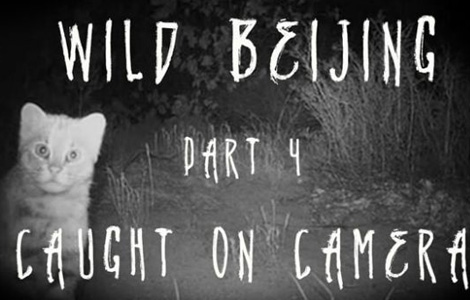Festival of dreams
Updated: 2013-07-21 11:21
By Chen Nan (China Daily)
|
|||||||||||
 |
|
Haya will perform at the festival. Like Magtaal's band Blue Fire, Haya is also based from Inner Mongolia. Photos Provided to China Daily |

When rock musician Magtaal first laid eyes on the beauty of Guyuan county, Hebei province, he knew it would be the perfect place for a music festival, but getting people to travel to the location could be half the battle. Chen Nan reports.
When Inner Mongolian rock musician Magtaal decided to hold an outdoor music festival at the Lightning River National Wetland Park in Guyuan county, Zhangjiakou city in Hebei province, he knew it would run at a loss.
Magtaal knew the festival would struggle to make money because the location is little known. But he simply could not resist the temptation of the beautiful scenery.
"I went to Guyuan county for the first time early this year and I soon decided to have an outdoor music festival there," says Magtaal. "Because I come from the grasslands of the Inner Mongolia autonomous region, I have a special awareness of the nature and I want to share this beautiful place with other people."
The Lightning River National Wetland Park festival will be held from July 19 to 21, and feature a wide range of musical acts.
|
|
|
Magtaal, rock musician |
Guyuan county borders Inner Mongolia to the north and Beijing to the south. Thanks to the nearby Bashang grasslands, the summer temperature of Guyuan county is as cool as 18 C during the daytime.
Around 300-kilometers from Beijing, Guyuan county is rich in water resources with 15 rivers and 12 natural lakes, which provides some of the water for Beijing, Tianjin and Inner Mongolia.
"When I thought about how the water running out of the water pipe at my house comes from those rivers and lakes, I felt it is my responsibility to let more people realize how important it is to protect the environment of this place," he says.
Within a month, he had gathered his musician friends to join the festival, including Chinese godfather of rock 'n' roll Cui Jian, rock singer-songwriter Xie Tianxiao and pop star Yang Kun.
"They are box office guarantees but it's still risky for a new music festival to be staged for the first time," he says.
Magtaal's concerns are not unfounded. Another outdoor music festival, Zhangbei Music Festival, will be held from July 26 to 28 on the Zhongdu grassland of Zhangbei county, Zhangjiakou, Hebei province.
Zhangbei Music Festival attracted nearly 300,000 people in its first year, and now five years later, it has expanded its lineup to more international acts.
However, Magtaal's intention has never been to compete in the market. Besides the natural scenery, what drove him to stage a music festival is his devotion to bring Chinese ethnic music, especially music from Inner Mongolia, to wider audiences across the world.
He set up an organization called And, which means "brothers" in the Mongolian language, to introduce bands from Inner Mongolia and other ethnic groups, including Magtaal's own band Blue Fire and Haya band.
Magtaal's passion for bringing Inner Mongolia music to wider audiences came from his mother, Dedema, a renowned folk singer, known as Nightingale of the Grassland.
Magtaal came to Beijing aged 10 with his mother, who bought him his first guitar. Unable to speak Mandarin, he felt lonely and found solace in music.

At 16, he founded rock band Face, and later joined Blue Wolf, a band founded by Tengger, one of the most successful musical figures to come out of Inner Mongolia. Tengger taught Magtaal how to combine traditional Mongolian music with modern music genres, such as rock and pop.
"My mother sings the most traditional folk songs of Inner Mongolia but from Tengger, I know Mongolian music could be presented in a different way," he says.
Mongolian music is characterized by chanting and khoomei, or throat singing, which remains central to the region's musical scene.
However, Inner Mongolian pop music today has grown to cover everything from heavy metal to hip-hop, and some singers and musicians choose to stay true to tradition while others willingly abandon their ethnic roots altogether.
"I could see the mutual passion for ethnic music through the music festival, which drove me to bring our music to a bigger stage," Magtaal says.
Related Stories
MTV to host biggest online-only music festival 2013-06-05 10:11
2013 Strawberry Music Festival in Beijing 2013-04-30 07:44
Music festival rocks fans in Qingdao 2013-04-24 11:32
International Music Festival held in Beijing 2013-04-24 11:32
Timberlake, Macklemore lead MTV Video Music Awards nominees 2013-07-18 09:14
Today's Top News
Divided Belgium to swear in new king
China sends strong signal of "deep-water" reform
Property lending accelerates in H1
Guizhou aims to become "Switzerland in the East"
China commits to building eco-civilization: Xi
Man hurt in blast at Beijing airport
New H7N9 patient in critial condition in Beijing
Girl killed by rescue truck
Hot Topics
Lunar probe , China growth forecasts, Emission rules get tougher, China seen through 'colored lens', International board,
Editor's Picks

|

|

|

|

|

|






